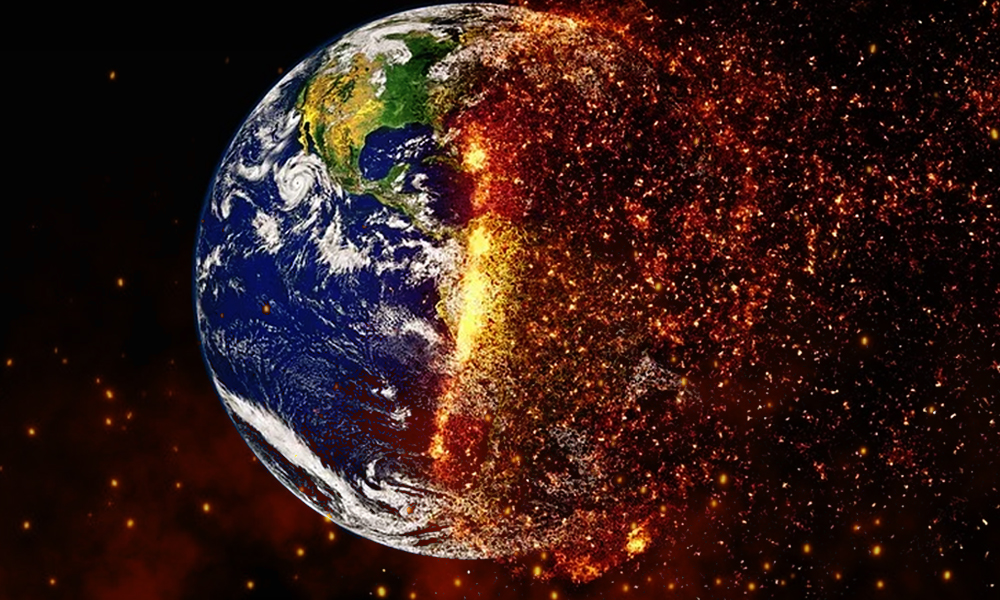
Image Credits: Wikimedia
Decoding Climate Change: Why You Should Worry About Earth's Systematic Death
Writer: Palak Agrawal
Palak a journalism graduate believes in simplifying the complicated and writing about the extraordinary lives of ordinary people. She calls herself a " hodophile" or in layman words- a person who loves to travel.
India, 4 Nov 2020 4:25 AM GMT | Updated 4 Nov 2020 4:27 AM GMT
Editor : Prateek Gautam |
A free soul who believes that journalism, apart from politics, should stand for social cause and the environment.
Creatives : Rajath
A free spirit who find meaning in life with the virtue of creativity and doing job par its excellence, animal lover and traveller by heart.
Although it is certain that Earth has naturally warmed up and got colder over the course of billions of years, such transition cycles have always been much slower, taking millions of years, whereas now, within a period of just 200 years, the planet is advancing towards extinction levels.
"2020 is on course to become the warmest year" revealed one of the studies reported by the World Economic Forum (WEF). It pointed out that the first nine months of the year witnessed record concentrations of major greenhouse gases – carbon dioxide, methane, and nitrous oxide in the atmosphere. These gases accounted for over 80% rise in global surface temperature altering Earth's climate.
The term 'climate change' has earned a reputation for itself in the recent past.
From being labelled as a 'hyped' concept to triggering heated arguments on public forums and the never-ending conspiracy theories surrounding it, the term climate change has undergone phases of human reactions. After initial years of denial and scepticism, humans are finally waking up to the sound of nature's alarm.
Additionally, the innumerable reports cropping up from across the world on a global anomaly in surface temperature have strengthened the need for a united call to action, to save Earth.
This conspicuous change in our planet's climate is also believed to be the cause of an increase in sea level, a substantial decrease in the arctic ice, and rising cases of weather-related catastrophes including floods, earthquakes, and droughts.
Let's Talk About Constant Change In Earth's Climate
Climate refers to the conditions of the atmosphere of a particular region over a long period of time. Solar radiation, temperature, humidity, precipitation (type, frequency, and amount), atmospheric pressure, and wind are some of the elements constituting climate.
While 'weather' is more about change in the atmosphere in just a few hours; climate could take hundreds, thousands, or even millions of years to change.
National Geographic, in one of its reports, explained the five mass extinctions which causes a widespread and rapid decrease in the biodiversity on Earth and also pointed out to the on-going sixth phenomenon.
Although it is certain that Earth has naturally warmed up and got colder over the course of billions of years, such transition cycles have always been much slower, taking millions of years, whereas now, within a period of just 200 years, the planet is advancing towards extinction levels.
Palaeontologist and conservationist Richard Leakey warned that human activity is paving way for a "sixth extinction".
Right now, reports have highlighted that the planet is experiencing a 'biodiversity crisis' that could put up to a million species of plants and animals at risk.
Activities like deforestation, poaching, industrialisation, burning of fossil fuels, population explosion, greenhouse gas emission, and plastic pollution are some of the major reasons for human-caused climate change.
The 2019 global biodiversity assessment by IPBES (Intergovernmental Science-Policy Platform on Biodiversity and Ecosystem Services) has revealed that out of an estimated eight million species, one million plant and animal species are currently threatened with extinction.
Today, the extinction-rate has accelerated and is occurring hundreds of times faster than they would naturally.
Also Read: Goa: Over 3,000 People Hold Midnight Protests Against Railway Expansion For Carrying Coal
 All section
All section














